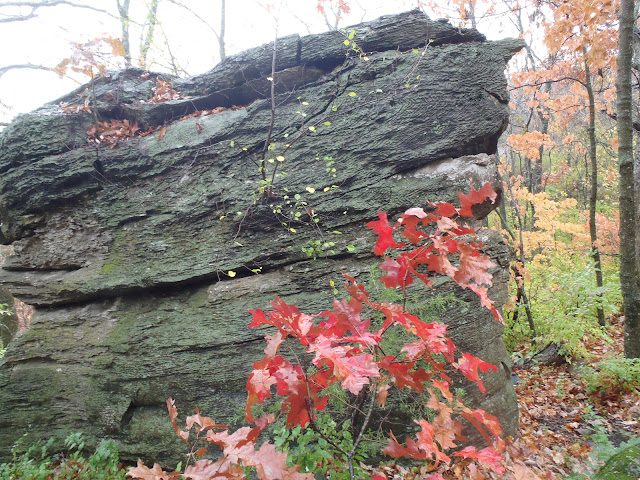A good friend of mine once told me that people in his home country would think hiking just to hike was an odd hobby. In that culture, hiking was just an integral part of the popular hobby of searching for mushrooms and other sources of food while enjoying the outdoors. Judging from the popularity of my
post on mulberries, I'm guessing there are many people in Arkansas who enjoy grabbing a free snack while out on a hike. Rather than make a new post every time I find some other tasty treat in the woods, I thought I'd try to compile lots of useful information on nature's treats all in one place. The following is a list of foods you can find in the wilds of Arkansas and when they are ripe. Obviously it isn't a good idea to go picking and eating things you find in the wild based on what you read on one website. If you want to get into this activity, go with some people who already know what they are doing. I will try to fill in more details and photos over time, but I wanted to get this up so people could start using it.
Mulberries - Red Mulberry trees grow all over Arkansas and produce tons of tasty berries in April and May. They are most often found in floodplains, river valleys, and on moist hillsides. The
USDA PLANTS site has more information on this (and many other) species.
Blackberries/Raspberries -
Several species of blackberries and raspberries grow in Arkansas. They are usually at their peak in late spring and early summer. The wild varieties are incredibly thorny, so be careful!
Persimmons - Persimmons are
an interesting fruit. The best persimmon is pretty tasty but not amazing in my book. The worst persimmon is about the worst experience you can put your mouth through. If you enjoy high risk, low reward situations, this fruit is for you. That said, I love them for that very reason since it is what makes them fun. The trees have a very distinctive
dark, blocky, bark and the fruits are ripe here around September - November. I recommend waiting until they are purplish-orange and starting to wrinkle before eating them. I've heard waiting until a frost helps guarantee sweetness. Some people claim placing them in the freezer for awhile before eating them makes them better. Make sure to take it slow on the first one and watch out for the large seeds!
Muscadines - These incredibly tasty
native grapes are larger and have thicker skin that the grapes you buy in a store. The wine made from them is really sweet but also delicious. There is some evidence that muscadines have higher levels of those healthy polyphenols than other species of grapes. I typically see them in rocky wooded areas, though they may grow in other conditions too.
Mushrooms - I don't know anything about picking wild mushrooms other than that it can be dangerous to do if you don't know what you are doing. If you are interested but have no experience, try to meetup with the
Arkansas Mycological Society.
Pecans -
Sweet Pecans grow in the wild throughout most of Arkansas. The pecan you are used to seeing is hidden inside a green husk. In the fall, that husk splits open revealing the nut. If you try to tear open the husk early because you really want to see a pecan, chances are it will stain your fingers a yellowish-brown.
Paw Paw - While I've known about this plant and its edible fruit since my Audubon days, I'd never eaten one until recently. Judging from my one experience, they are ripe at the end of summer or the beginning of fall. Apparently eating wild ones can be a bit like playing the lottery since flavors can vary greatly. I must've really lucked out with this one, because it was everything the unbelievable descriptions said it could be: a creamy mix of pineapple, banana, and mango with a little something extra that I IDed as circus peanuts. I saved the seeds and will attempt to grow my own!
 |
| Mulberries |
 |
| Persimmons |
 |
| From Left to Right: Blackberries, Serviceberries (Huckleberries?), and Blueberries |
 |
| Pawpaw Fruit on the Shrub |
 |
| Ripe Pawpaw |
 |
| Inside of a Pawpaw Fruit |


































